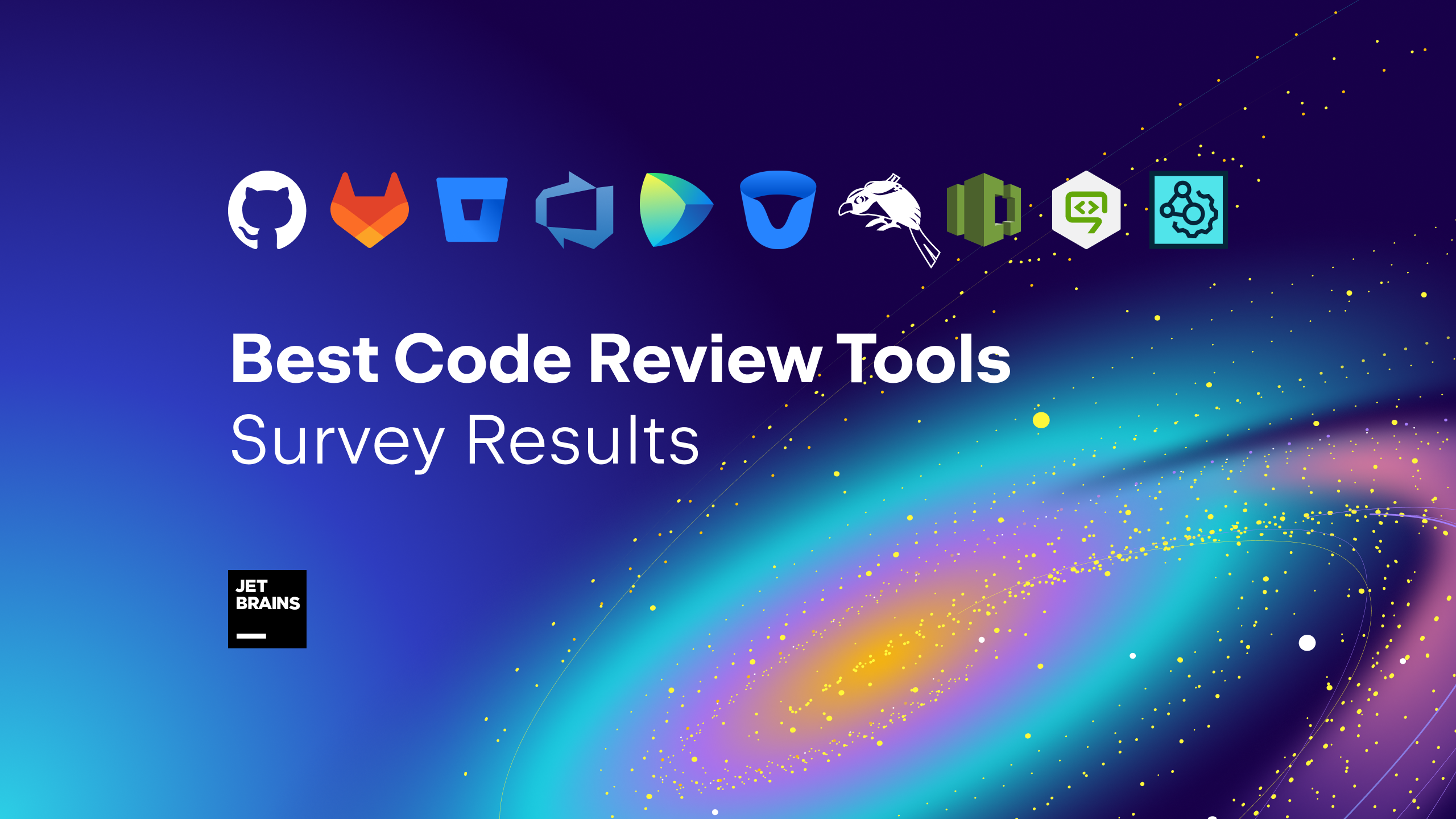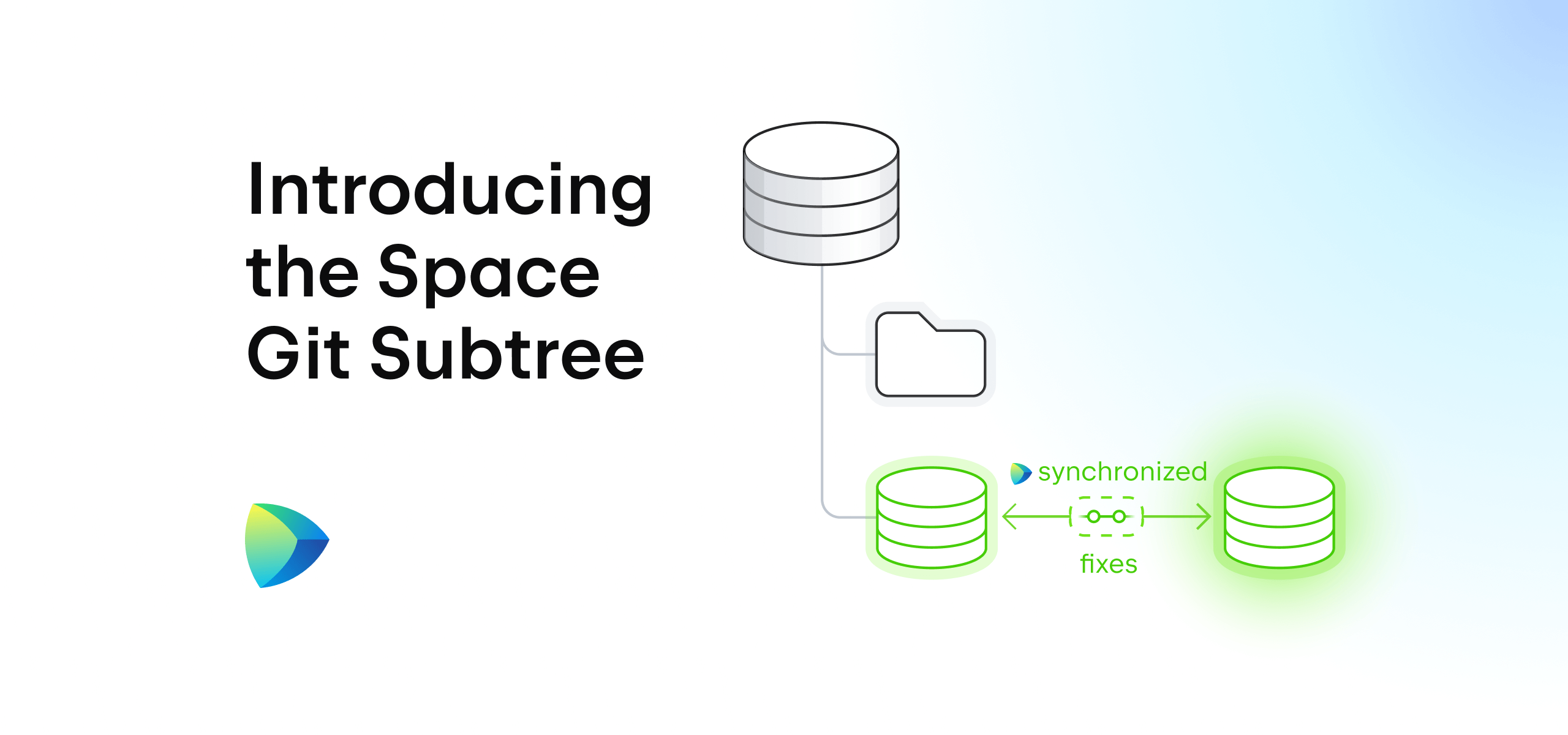Space
The intelligent code collaboration platform
Space and SpaceCode will be discontinued on June 1, 2025. Learn more → →
Best Code Review Tools for 2024 ‒ Survey Results

Code reviews are an essential part of the software development process. They allow you to identify problems with your code before it is implemented, cutting down on time spent fixing bugs and freeing developers up to do the work they are most passionate about. 9% of developers confirmed that they use a code review tool on a regular basis.
While the benefits of incorporating code reviews into your workflow may seem straightforward, the wide range of available code review tools can be overwhelming, and finding the right tool that suits your needs can prove challenging. Many code review tools provide similar functionality, yet the workflows and integrations they support can differ wildly. Faced with all these options, how can you identify the best review tool for your project?
Fortunately, we at JetBrains released the State of Developer Ecosystem 2022 report, which compiles the responses of over 29,000 developers to questions pertaining to different aspects of software development. Along with the latest trends in the tech industry, this research identifies the most-used code review tools, and we’re happy to share the results with you.
Read on to discover the most popular code review tools for 2024 and find the one that will best help you improve the quality and efficiency of your product development.
What is a code review tool?
Code review is a quality assurance technique where the author of a piece of code asks another developer to look over it before it becomes part of the code base. The code review process can be as informal as having someone look over your shoulder while you explain your work to them, or it can be far more structured, with multiple rounds of documented feedback and quality gates that ensure code meets a certain standard before it can be merged.
Code review tools help development teams work together on code, and they ensure code quality and consistency. These tools can provide a clear structure for the reviews, integrating them into larger development workflows. They can also streamline communication between the parties involved, providing a record of the process and allowing participants to more easily track what needs to be done.
What kinds of code review tools are there?
Code review tools come in many forms, with 25% of developers using cloud-based code review tools. Here’s a quick overview of some of the key differences to take into account when looking for a tool that suits your needs.
- Bundled vs. standalone tool
Some code review tools are bundled into more comprehensive services or suites – such as GitHub, Azure DevOps, or JetBrains Space – while others are standalone resources. It’s important to take into account how integrated a solution can be with the resources you already have in place.
- VCS support
Even though Git is one of the predominant version control systems out there (91% of developers surveyed use Git), code review tools can be differentiated by the VCSs they support:
- Git (the vast majority support Git)
- Mercurial (Review Board)
- Apache Subversion (RhodeCode, Collaborator)
- Workflows
Code review tools support distinct development workflows, which may influence your ultimate choice:
- Pull/Merge requests (GitHub, GitLab, BitBucket, Space)
- Commits (Space)
- Patches/Diffs (Gerrit, Phabricator)
- Automation features
Some code review tools can automate parts of the review process by providing static analysis or integration with CI/CD tools. Automating aspects of the process reduces the heavy lifting that is demanded of reviewers, which allows them to focus on providing helpful feedback without getting bogged down in minutiae. Here are some features that can simplify your code review process:
- Code navigation (GitLab Code Intelligence)
- Integration with CI/CD tools (Space)
- Security checks
- Detecting and fixing code issues (SonarQube, BitBucket)
- AI features
We are now witnessing the rise of AI-powered tools that offer new capabilities, particularly in static code analysis. These tools can help identify critical issues or bugs and recommend ways to improve overall code quality.
The variety of features, integrations, and supported VCSs and workflows means that there is probably a tool out there that suits the needs of just about any team. Our list of the top code review tools in 2024 offers a great place to start your search for the one that’s best for you.
The best code review tools according to our State of Developer Ecosystem report

1. GitHub
On GitHub, code review tools are built into pull requests. You can request reviews, propose changes, keep track of versions, and protect branches to improve the quality of your code.
Pricing: offers a free plan; paid plans start from $4 per user, per month.
2. GitLab
GitLab allows reviewing code, discussing changes, sharing knowledge, and identifying defects in code among distributed teams through asynchronous review and commenting. GitLab can automate, track, and report code reviews.
Pricing: offers a free plan; paid plans start from $29 per user, per month.
3. Bitbucket
Atlassian’s Bitbucket Code Review is a code-first interface that allows users to review large diffs, find bugs, collaborate, and merge pull requests.
Pricing: offers a free plan; paid plans start from $3 per user, per month.
4. Azure DevOps
Microsoft’s Azure DevOps code reviews are built into its Azure Repos and support a pull request review workflow. They offer threaded discussions and continuous integration.
Pricing: basic plan is free for teams of five, then $6 per month for each additional user.
5. Gerrit
Gerrit is an open-source tool for web-based code reviews, with Git-enabled SSH and HTTP servers. Built on the Git VCS, Gerrit’s patch-oriented review process supports the typical workflow for open-source projects.
Pricing: free to use.
6. Crucible
Atlassian’s Crucible is a lightweight code review software that features threaded discussions and integrations with Jira Software and Bitbucket. Since 2020, Crucible has been in basic maintenance mode.
Pricing: one time payment of $10 for up to five users or $1,100 for larger teams.
7. AWS Code Commit / AWS Code Star
AWS CodeCommit is a source control service that hosts private Git repositories and offers built-in support for pull requests. It is compatible with Git-based tools, making it easy to adopt without significant tooling or workflow adjustments. AWS CodeStar is a cloud‑based development service that provides tools for quickly developing, building, and deploying applications on AWS.
Pricing: CodeCommit offers a free plan for up to five users; paid plans start from $1 per each additional user, per month. There is no additional charge for AWS CodeStar – you only pay for AWS resources.
8. JetBrains Space
JetBrains Space code reviews allow you to integrate code reviews seamlessly into your development pipeline and review code from the Space UI, from JetBrains IDEs using the power of IDE navigation, or even on mobile.
With the Space Git flow, you will keep your main branch green using quality gates and make your builds stable using Space CI/CD or integration with TeamCity. Getting started with Space is easy, as you can host or mirror your code repository from GitHub or another Git service in a few clicks.
Space is not limited to code reviews. It is an intelligent code collaboration platform that covers the entire software development pipeline: hosting Git repositories, automating CI/CD processes, publishing packages, and managing issues, documents, and chats – all in one place.
Pricing: offers a free plan for both cloud and on-premises versions; paid plans start from $8 per user, per month.
9. Helix Swarm
Helix Swarm is a web-based code review tool for the Helix Core VCS. It integrates with the complete Perforce suite of tools, providing teams who use Helix Core with a range of resources for working collaboratively.
Pricing: free to use.
10. Collaborator
SmartBear’s Collaborator is a peer code and document review tool that integrates with a wide variety of IDEs and hosting services. It boasts a customizable workflow, allowing it to fit seamlessly into your pre-existing work processes.
Pricing: paid plans start from $635 per year for up to 25 users on five subscriptions.
11. Review Board
Review Board is an extensible tool that supports performing reviews on a variety of file types, including presentations, PDFs, and images, in addition to pure code review.
Pricing: paid plans start from $29 per 10 users, per month.
12. Gogs/Gitea
Gitea and Gogs are open-source projects that aim to provide self-hosted Git services that are lightweight and easy to set up. Serving primarily Go users, these projects support a standard pull-request workflow for code reviews.
Pricing: free to use.
How to choose a code review tool
One of the most remarkable trends we found in our 2022 State of Developer Ecosystem Survey results is the popularity of code review tools built into larger ecosystems. Indeed, most respondents by far use code review tools that are included in more comprehensive platforms, such as GitHub, GitLab, or JetBrains Space, or are integrated with larger suites, such as Atlassian’s. This suggests that many developers prioritize code review software that conforms to their pre-existing workflows and can be integrated seamlessly with solutions for other stages of the software development pipeline.
We asked our developers at JetBrains how they suggest choosing the code review tools, and here’s what they had to say:

“For me, the ability to have navigation is super useful, and usually saves me from having to clone the entire merge request just to review code.”
– Pasha Finkelshteyn, Developer Advocate, JetBrains
“This might sound obvious, but choosing the right tool really boils down to taking a close look at how your team and organization works. What are you reviewing? Who is reviewing? Who signs off on a code review? Pick a tool that is compatible with your development process, or one that can be customized enough to support your workflow.

Start with why. Why are you doing code reviews? To find bugs? To share implementation knowledge? To have a quality gate before merging to your main branch? Whatever the reason, the tool should closely fit your team’s “why”, and help with discussing code, support continuous integration hooks to automatically verify code, and more.”
– Maarten Balliauw, Developer Advocate, JetBrains
Why do people use custom code review tools?
Incorporating a new code review tool into your development process may seem less attractive if it requires you to completely adjust your workflow. Similarly, if you have to continually switch between tools in order to perform your code reviews, you may find that the benefits you enjoy from adopting them are offset by the time and focus you lose shifting contexts.
The need to find a tool that is compatible with pre-existing workflows may account for the surprising number of respondents who use a custom code review solution – 10% of software professionals reported using a custom code review tool.
How can you improve your code review process using tools?
When looking for a solution to adopt, you may consider whether the tool you choose can automate parts of the code review process for you. Resources that provide static code analysis or code insight as part of code reviews, for example, can significantly reduce the reviewer’s cognitive load. This both speeds up the process and improves the quality of the final result.
If you want to speed up code reviews and ensure that all developers use the same code style, formatting, and inspection rules, consider JetBrains Qodana – our new code quality platform. Its static analysis engine is designed to bring all native JetBrains IDE inspections to any CI/CD pipeline, including TeamCity, GitLab, Github, Jenkins, and others. Qodana is fully compatible with the majority of JetBrains IDEs, including IntelliJ IDEA, PhpStorm, and WebStorm. It supports 60+ languages and technologies and allows you to analyze unlimited lines of code.

Similarly, code review solutions that integrate with your IDE allow you to take advantage of the navigation and insight features you already rely on every day. With its first-class JetBrains IDE integration, JetBrains Space allows you to review and comment on code using the power of IDE navigation. Using it, you can manage your merge requests and code reviews right inside your favorite IDE without having to change contexts.
As a unified platform for the complete software development pipeline, Space supports a variety of workflows and provides integrations with all of the services that are crucial for your development process, such as CI/CD and Git hosting.
Conclusion
Code reviews are a valuable technique for ensuring that your development process yields quality results, and your choice of code review software should not be taken lightly.
By identifying the most popular code review solutions, our 2022 State of Developer Ecosystem report provides a great starting point as you look for the tool that’s right for you. But the right tool is not necessarily the most popular one, and it is important to find a solution that offers the integrations and features that best support your unique approach to the development process.
What do you think is most important in a code review tool? Let us know in the comments below!
Subscribe to Space Blog updates








